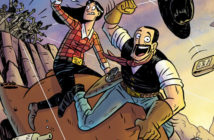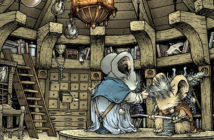The devil’s personal banker of souls is roaming the earth in Aposperos: Merchant of Souls, and he wouldn’t exist if it wasn’t for the literary imagination of Nektarios Chrissos. Hailing from Iraklion Crete, Greece, this versatile writer has joined forces with artist George Martzoukos to create a dark universe of spirituality and fatalism that is unlike anything currently at work in today’s comics industry.
Recently, Broken Frontier’s Steven Surman had the opportunity to talk with Chrissos about his work on this one-of-a-kind digital comic book.
Steven Surman: Before we even discuss Aposperos, tell me about your work outside of comics. I understand you’re a trained lawyer and a teacher. Tell me about your education as a lawyer and your current career.
Nektarios Chrissos: Right after high school, I studied law at the Democritean University of Thrace, [located]in Greece. I graduated in 1997 with a bachelor’s degree in law, which is enough to practice law in Greece. After serving my mandatory military time in the infantry (from September 1998 to August 2000), I began my own law practice, which has been my main career until now.
Just after finishing my studies in law, I also took tests for the Department of Psychology ay the School of Social Sciences in Rethymnon, Crete. I studied there while working and took my degree in psychology in 2005. I am a qualified psychologist by law, but I don’t practice that profession.
I have also been working part-time as an IT Teacher (using my accumulated experience in computers) at a local Computer Learning Centre, ECL. My main fields of focus in law have de facto been real estate law, civil law, commercial law, property law and penal law. I maintain a website at www.cretanlawyers.com. My older brother is also a lawyer here and has been my associate since I started my practice.
SS: Apposed to your career, you clearly enjoy writing as well. When did you first start writing creatively? What was your initial inspiration?
NC: I have been reading fantasy fiction and comics since a very early age. During my teens, I had also been an active pen-and-paper role player, mainly as a [game master]. But I began writing creatively sometime between 1996 and 1997, when I happened to win a fantasy fiction contest in Greece.
My initial inspiration were the classic epic fantasy works such as the Lord of the Rings trilogy, Conan comics and novels, the Lone Wolf gaming books, Dragonlance, and others. Now I am mainly inspired by real-life stories and I like using sci-fi elements in my stories.
SS: What prompted you to move over to comic books?
NC: I have been reading [the stories of]Mickey Mouse, Popeye, Spider-Man, Captain America, Conan, Rom, and other comic-book characters since a very early age. When I was at university, I also discovered comics for mature readers, mainly the DC Vertigo titles: Constantine, The Sandman, and the Books of Magic to name a few.
So I was very into comics as a reader for most of my life. In 2004, I thought I could do stories for comics, since I had a very cinematic (or sequential) feel in most, if not all, of my stories. I began browsing comic book and art forums where I met artists; from there, I slowly began trying to break into the comics industry. Much later, in 2006, I joined Visionary Comics after submitting a small, Aposperos-related comic script to them.
SS: One of the reasons why I’m so encouraged by your book, Aposperos, is because it feels like an entire world is taking shape, all being led by the intoxicating protagonist, Niko Carris. Tell me about your process in creating this fictional world and character.
NC: Aposperos began as an idea I had for a small comic that I was supposed to make with a local artist back in 2003, I think, but that comic never came to be. Then in 2005, I wrote a short story with the character based on a Poe poem, which was published (in prose form) in Azodd magazine, in Greece. Since his creation, however, the character was always in the back of my mind and I found a good use for him when I first submitted a script to the then-new Visionary Comics Studio.
And when Chuck Sellner, the Studio’s creator, asked me for a more complete proposal, I began creating the universe around the original character; since he would, at that point, need allies, foes, and a solid world to live in. I had lots of background work to do.
When creating the world and character, I mixed various concepts: sci-fi, fantasy, horror, occultism, religion—trying to create something that would be remotely original, hopefully without being corny and clichéd. I guess that, as the story progresses, it will show whether I succeed or not.
SS: Aposperos is richly vivid. Aside from the first issue of the comic book, how large is your vision for this series?
NC: My vision is as large as potential colleagues (artists, producers) will have it be. The main plot as I now have it on paper could, perhaps, be able to make as many as 24 issues or as few as eight, depending on what aspects of the story I decide to focus on and what plotlines to include or leave out. I could also imagine it as a feature film or a two-season TV series, but that is wishful thinking.
Anyway, Aposperos was created to be a comic and would better work as such. 20 to 24 issues would be just fine with me!
SS: Actually, I now have a small plot question to needle you with. In the press materials for Aposperos, the protagonist, Niko, is referred to as “Aposperos,” as the title of the book suggests. Can you explain the differences in the names?
NC: Sure: Aposperos is the name I created for the character as a concept, but is too weird in Greek to be a normal name. It’s an abbreviation of “Aposperitis,” which is the “Evening Star” in Greek. I also recently learned that in naval slang, Aposperos is “West Wind.” I like that!
So, I guess that Niko couldn’t be called Aposperos just like John Constantine couldn’t be called Hellblazer! There’s that, but also realize the fact that Niko seemingly is an “ordinary” man with an “ordinary” life who should go on with his “career” low profile.
All those points taken into consideration, however, Aposperos actually is (and will be) used for Niko in the comic as his formal codename inside his cult.
SS: The first issue has quite a bit of sequences involving police and legal procedural. How much, if any, does your experience as a lawyer influence the elements you’re working with in this book?
NC: To be honest, my career in law hasn’t really influenced the elements I’m working with, since I haven’t happened to handle crimes-against-life cases until now.
However, because of my studies, I have an adequate general idea of the penal system in Greece, which I use in the story. Of course, inevitably, Inspector Papadakis’s investigation is (and will be) dramatized a bit, otherwise it would probably be a boring fight against paperwork if I kept it boiled down to hard-reality.
SS: Your book is one of the best finished products of an initial “independent comic” I’ve seen in a very long time. Half of the reason for this is because of the amazing images of George Martzoukos. How did you and he begin your comic-book relationship?
NC: I met George through Deviantart. I had first seen his art in Azodd magazine—he coincidentally had a story in the same issue I had the Aposperos short story in—and then I browsed the art he showcased on the site and sent him a message regarding the Aposperos idea.
Everything else from there on flowed naturally.
SS: George’s artwork is so highly specific and fine, from the photography to the other-worldly paintings of the finished Aposperos book. How much direction do you give him in your scripts?
NC: I am not a fan of the “Marvel way” of doing comics, so I usually do full scripts. My scripts usually contain everything art-related, like angles and very specific stuff inside the panel.
However, if George presents me with a different panel (or page) structure that would work equally well, then I won’t tell him no. It happened more than once in the first issue of Aposperos. Comics are about collaboration, anyway; it can rarely be effective as a one-man show, either from the writer’s or the artist’s perspective.
SS: Your book is printed digitally by Visionary Comics, which carries some pros and cons. But there is always the ultimate satisfaction of holding a finished, material book in your hand. Would you like to see Aposperos in print at some point, such as a trade paperback?
NC: It’s my dream! Of course I would like that. After all, I grew around printed books and comics, and that joyous feeling of holding the printed sample of my work in my hands is something I wouldn’t change, even for an iPad full of every comic-book title I would ever need!
SS: What can you tell us about the future of Aposperos, both as a story and as a printed comic book?
NC: Well, story-wise, I can tell you that the plot will go into very twisty paths as the story progresses. Characters might change sides and perspectives more than once, and even the setting as a whole will be full of surprises until the end.
Print-wise, I don’t know where it’ll go, but if I get the opportunity to publish Nick’s story until its very end, I think it certainly would be worth the paper it would be printed on.
The staff of Broken Frontier would like to thank Nektarios Chrissos for taking the time to discuss Aposperos: Merchant of Souls and his work on it.
For more information, please visit Visionary Comics. And to purchase the first issue of Aposperos: Merchant of Souls, please visit Drive-Thru Comics, where the book is available for digital download at the low price of $1.49.
This interview originally appeared on Broken Frontier.




